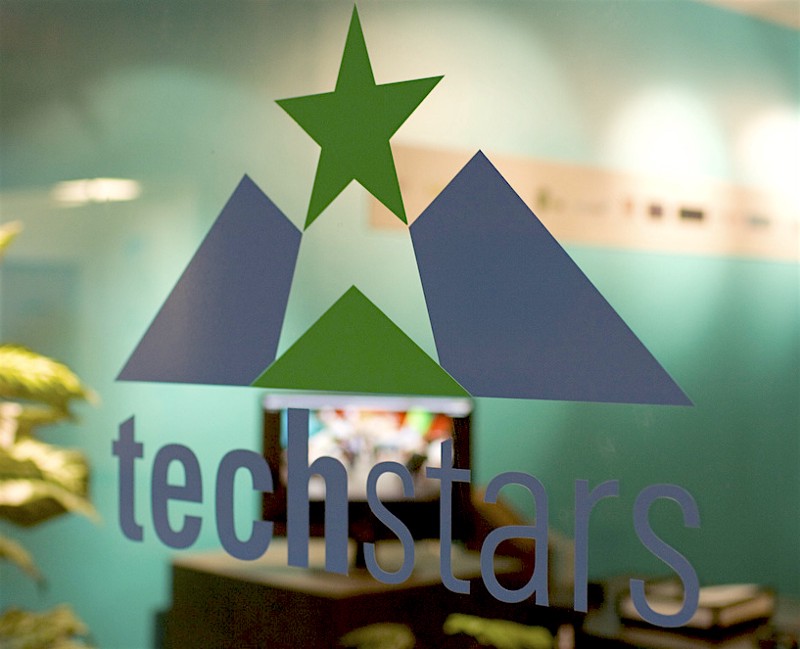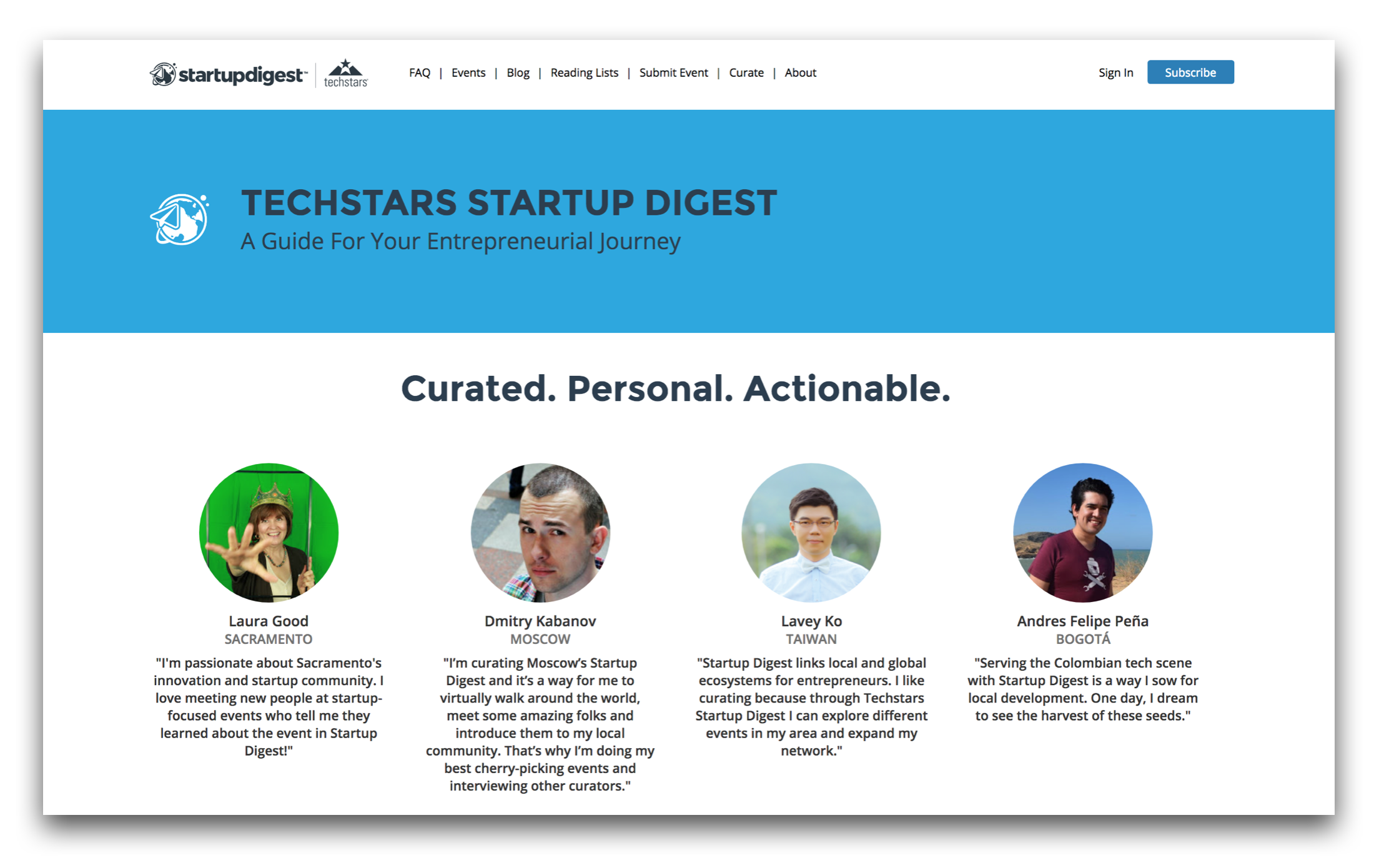Entrepreneurs are constantly looking for new tools and possibilities to develop their businesses and enrich their knowledge. One of the ways of doing this is visiting themed events — meeting colleagues in real life, exchanging experiences, and communicating with potential investors.
In fact, there are thousands of tech-focused events taking place annually. The important thing is to pick the best, most useful and easily accessible ones to optimize your time and expenses.
Techstars Startup Digest solves this problem by sending its subscribers an email newsletter with a curated list of relevant and reasonably priced events for entrepreneurs. Currently, Startup Digest consists of more than 700 curators, is approaching 700K subscriptions, and is available in more than 300 cities all around the world. Today, I’d like to share its history, how the founders came up with the idea, what it looked like in the initial stages, and what it’s going through right now.

Techstars | Photo by Bill Erickson CC BY-NC
The Structure
The Startup Digest program consists of two parts:
- Events digests by area, prepared by local curators. Digests include events for founders, developers, designers, marketing experts — anyone who is interested in startups.
- Themed reading lists. These are organized by topic or industry, and include articles and resources chosen by the curators. Here you can find reading lists on human resources, blockchain technologies, startup communities, AI systems, and other fields.
Digests are compiled by curators who are immersed in the local startup community and are experts in a particular field or manage a business. For example, the curator for New York City is Carleen Pan, who is helping startups with marketing, launch and growth strategy. She notes that she has always loved the small community feel. “There’s a lot happening in NYC tech but no one is more than 2 or 3 connections away. People are always willing to make introductions, offer advice or help out,” Carleen said.
The curators for Startup Digest do not get paid; they do all of it on a voluntary basis. Back in 2011, one of the curators who was responsible for the Miami Digest said: “To me, this seems like a reasonable quid pro quo. I am leveraging the SD franchise and infrastructure to service the community (something I feel is important), while at the same time enhancing SD’s infrastructure/network value by my efforts.”
2009: How Techstars Startup Digest Began
The founder and first curator of Startup Digest was Chris McCann.
Chris moved to Silicon Valley in June 2009 and was going to many startup events (technical talks, developer meetups, hackathons, etc.) to meet other people building and working on startups. He started compiling a list for himself of all the good startups events and in November 2009 sent the first digest email with a list of startup events to his 22 of his friends.
In order to make sure the events he recommended were quality events, Chris attended every meetup he featured in the first newsletters. Because the newsletter spread awareness of the best events, most event organizers let him make a 2-minute speech about Startup Digest at the end of each event. This was how the newsletter spread from its original 22 subscribers to 12,000 subscribers in only 90 days.
To subscribe to the email newsletter in the beginning, people just had to drop a message directly to Chris or to his co-founder Brendan McManus. Back then Startup Digest did not have a website since the newsletter was essentially a signup form. A few months after the newsletter started, Chris and Brendan came up with the name Startup Digest and built a simple website for people to sign up.
Once Startup Digest had a name and a website, the newsletter was covered by TechCrunch in December 2009 and the subscriber count exploded in popularity. This was also the time when entrepreneurs in cities from around the world started reaching out to Chris and Brendan to express interest in creating their own version of Startup Digest in their local city.
The first curator after Chris was Carter Cleveland, the the co-founder of Art.sy, who became the curator for the New York City Startup Digest. In addition to being the first curator in NYC, Carter was the person who helped Chris and Brendan create the curator model to allow other entrepreneurs to create their version of Startup Digest in their own cities.
“Fundamental to Startup Digest now being in 300 cities with 700k subscribers was the creation and scaling of the curator model used to publish and maintain all of the local editions of the newsletter.
There would have been no way for us to centrally know about all of the good startups events in each of these local cities, so instead we allowed the community itself to curate the best events in a decentralized fashion,” — said Chris.
2011: First Investment
In March 2011, the startup received $200,000 in funding from the Kauffman Foundation — a nonprofit, private foundation established by Ewing Marion Kauffman in the mid-1960s. This is one of the largest private foundations in the US with an asset base of approximately $2 billion. The investment was an inflection point for Startup Digest and was used to:
- Hire Jessica Ford full time, as the editorial director to work on scaling our content
- Scale Startup Digest to more cities around the world
- Create a new product focused on talent and recruiting for top startups
- Producing video tutorials and educational content for entrepreneurs
“I joined Startup Digest as a part-time editor in August 2010. I was new to the startup world and found it very exciting to be a part of something from the early stages. It was a whirlwind during this time and the growth was pretty remarkable. We felt like we were a part of our own version of The Social Network.” — Jessica Ford, Director of Startup Digest
At that time, the Digest consisted of more than 120k subscribers in 50 cities and was growing steadily. The core audience included founders, venture capitalists, business angels and IT experts.

David Cohen introduces Techstars NYC Demo Day | Photo by Alec Perkins CC BY
2012: Acquisition by Startup Weekend
On October 3, 2012, Startup Digest was acquired by Startup Weekend, organizer of weekend events around the world where you create a real company in just 54 hours. The sum of the deal remained undisclosed. As a result, it was agreed that Startup Digest would become a non-profit part of Startup Weekend and act as a driving force to promote its initiatives.
“Our short-term goal will be to scale Startup Digest to as many communities as we can. Startup Digest is in 99 cities currently and Startup Weekend is in 335 cities. We would love to see a Startup Digest for every SW city around the globe,” Joey Pomerenke, Startup Weekend’s former CMO, said to TechCrunch.
At that point, Startup Digest reached more than 230,000 subscribers across 43 countries around the world. The company’s co-founder Brendan and the editorial director, Jessica Ford, decided to stay on the team.
Chris McCann and Chris Burnor, the CTO, moved on to developing a new product called GroupTie, the goal of which was to solve organizational issues and manage interaction between employees; the project was aimed rather at corporate clients and potential users.
2013: New deal with UP Global and Startup America
In January 2011, when Startup Digest was starting to actively develop and had attracted its first investment, the U.S. saw the launch of a program called Startup America. Together with that, there was Startup America Partnership — a collaboration of corporations, universities and foundations in support of innovation startups across the country. Just two and a half years into its existence, there were more than 13,000 startups.
In May 2013, Startup America Partnership and Startup Weekend created UP Global, a combined organization designed to become a powerful mechanism for empowering the tech entrepreneurial community. Startup Weekend and Startup Digest both joined UP Global.
The organization’s commitment was to support and train 500,000 entrepreneurs in 1,000 cities in the country over the following three years. Google for Entrepreneurs, Microsoft and the Coca-Cola Company became partners of UP Global.
2015: New life with Techstars
In June 2015, Techstars acquired UP Global as a whole, including Startup Weekend and Startup Digest. By that time, UP Global was present in 600 cities in 120 countries, while Techstars had more than 18 accelerator programs for startups around the world. More than 1,000 companies have taken part in these programs, raising over $4 billion in investments.
The goal of the acquisition was to make entrepreneurship more accessible to everyone around the world throughout the joined infrastructure of Techstars, Startup Weekend and Startup Digest.
“I think what is most exciting about all of this is the way we see Techstars and UP Global alumni or past participants coming back and becoming angel investors and/or mentors in the network. This is a virtuous cycle that we believe will have a very long-term impact on global entrepreneurship,” David Cohen said in an interview for Entrepreneur.

Photo by  At Scale
At Scale
Techstars Startup Digest is now part of a much larger worldwide network and continues to help entrepreneurs succeed. Organizational changes come with a set of challenges, but in following the Techstars #givefirst motto, the senior leadership team was quick to embrace Startup Digest as the free community building tool it has been since day one.
“This year we focused specifically on revamping our reading lists. We’ve moved all reading lists to a newsletter platform called Revue, which has allowed us to improve both the curator and subscriber experience.
Startup Digest curators are now able to tap into the power of the Techstars network as an added benefit for volunteering their time,” Jessica Ford said.
Techstars Startup Digest is so much more than events today. In fact, as curated source of information that’s tailored for anyone interested in startups, it’s a catalyst for local community development — it brings people together.
About the author:
Dmitry works with brands to create content and promote corporate culture at scale. Apart from it, he is curating Techstars Startup Digest, and acting as an advisor for the SXSW tech festival.
The Game of Archetypes: How Storytelling Works for Tech Brands
Scaling into English-speaking markets with Habr.com
How to Scale Your Corporate Culture
The History of SXSW: How It All Started
How the Need for Innovation Sparked the Birth of the Tech Industry
How the Early Success Stories Shaped the Modern State of the Tech Industry
Автор: dmitrykabanov



